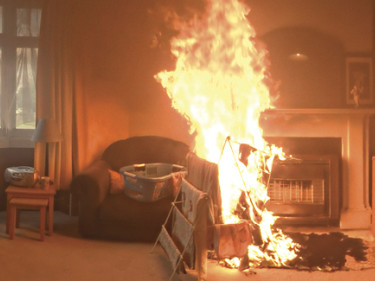After a fire, there may be fire, smoke or water damage to your property.
You may need to hire professional fire and water damage restorers, depending on the extent of the damage. Check the Yellow Pages or Google 'flood and fire restoration work'.
There are some key things you need to know when restoring a property after a fire.
Food safety
- Throw away any food, drinks or medicine that have been exposed to fire, smoke or water.
- Wash tins and jars in detergent and water. Don't eat tinned food if the tin has bulged or rusted.
- Don't refreeze any food that has defrosted.
Kitchen utensils and electrical appliances
- Wash cooking pots and pans with detergent and water. Then rinse and polish with a fine-powdered cleaner.
- Polish copper and brass with special polish, salt sprinkled on a piece of lemon, or salt sprinkled on a cloth saturated with vinegar.
- Have all electrical appliances checked by a qualified service person before you use them.
Walls, floors and ceilings
- Clean soot and smoke from walls and floors with mild soap or detergent. Rinse with clear warm water and dry thoroughly. You can also use the following cleaning solution - make sure to wear rubber gloves:
- 4 to 6 teaspoons emulsifying solvent cleaner (a cleaning agent you can find at a hardware or paint shop)
- 1 cup household cleaner or chlorine bleach
- 4 litres warm water
- Don't repaint until the walls and ceilings are completely dry.
Furniture and furnishings
- Dry rugs and carpets as fast as possible because they will begin to rot. A carpet dealer or professional carpet cleaner can give specific advice.
- Scrub wooden furniture with cleaner and a brush. Dry thoroughly in the shade where there is good ventilation. This will stop mould and mildew from developing.
- Dry wooden furniture away from heat and sun or it will warp. Remove drawers when drying to stop them sticking.
Leather
- Wipe leather goods with a damp cloth and then a dry cloth.
- Stuff purses and shoes with newspaper to keep their shape.
- Leave suitcases open.
- Rinse leather and suede jackets in cold water.
- Dry leather goods away from the heat and sun to stop them cracking. When they're dry, clean them with saddle soap.
Books
- Take care of wet books as soon as possible.
- The best method to save wet books is to freeze them in a vacuum freezer. This special freezer will remove the moisture without damaging the pages.
- In the meantime, put them in a household freezer. This will stop the pages sticking together and rotting until you can find a vacuum freezer.
- A local librarian or book restorer might be able to give you more advice.
Cash
- Don't throw away damaged notes and coins - these will usually still have some value.
- As long as cash is still recognisable as currency, the Reserve Bank of New Zealand will pay on it. To receive payment on damaged cash, take it to a local bank or the Reserve Bank in Wellington.
Clothing
- The smell of smoke and soot can sometimes be cleaned from clothing. But test garments before using any treatment to make sure it won't do more damage.
- Follow the care instructions on the garment, or try:
- 4 to 6 teaspoons emulsifying solvent cleaner
- 1 cup household cleaner or chlorine bleach
- 4 litres warm water
- Mix well then add your clothes. Rinse with clear water and dry thoroughly.














